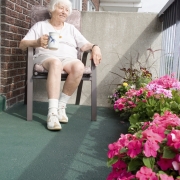Independent Living Centers: What the Facility and Residents Are Really Like
Despite the early stages of dementia or problems with mobility, seniors still want to maintain independent living. It gives them a sense of being in control rather than feel helpless and fully dependent on someone else.
There are misconceptions that assisted living centers are only for seniors and people with disabilities who can no longer fend for themselves. This is why aging individuals don’t want to live in them.
What if we tell you that there is an assisted living community that enables you to maintain independence?
An independent living community provides seniors with the freedom they need in their old age in a happy environment and with a culture that fosters having fun and keeping busy and alert.
Independent Living vs Assisted Living
To ensure there’s no confusion from here on out, you should know the difference between the two.
Independent Living
- Residents have their own private dwelling spaces in different housing arrangements
- Laundry and housekeeping services are provided to minimize the daily responsibilities of a resident
- May have a centralized hospitality building designed for socialization
- Typically, not licensed by the federal government or the state, the criteria of residents for independent living communities are more relaxed.
- Arrange recreations schedules for residents
Assisted Living
- Residents live in typical apartment-style units that may or may not have a fully equipped kitchen
- Staffed by at least one medical professional as most residents will need some form of assistance, including medical-related ones
- More heavily regulated and has more regulations than independent living. Not everyone qualifies for assisted living. Many government agencies will be involved such as the health department if the community serves meals.
- Arrange recreations schedules for residents
Given the differences, it’s easy to see that seniors living in either facility have varying experiences as well.
In an independent living center, residents…
- Enjoy wonderful conversations and form a friendship with people from diverse backgrounds. Residents in such communities come from different walks of life and professions, creating a fun environment for everyone.
- Enjoy an active lifestyle, engaging in different activities that make senior living exciting. Typical activities include but are not limited to Continuing education courses, Exercise classes, Game nights, Field trips, Holiday celebrations, and Support and discussion groups.
- Maintain independence even when they need help with two or three daily living activities such as bathing, dressing, and medication management. In most cases, independent living can be likened to staying at a hotel with a medically trained staff as a concierge.
- Live in comfortable and spacious accommodation or apartments, complete with maintenance and housekeeping services, security, transportation, and excellent dining options.
Is independent living right for you?
Even when all the features of this community sound good to you, it’s best to evaluate how suitable this type of senior living is for you. Making the right choice will depend on several factors.
- The facility’s guiding approach to caring for seniors aligns closely with your own beliefs and attitudes.
- It leaves a warm and vibrant impression on you.
- Its location works best for your needs—close to where family members live, has an urban vibe, or in a peaceful rural setting.
- It has access to entertainment and activities that can help you stay alive and healthy longer.
- It has easy access to public transportation if you travel a lot or is a frequent flyer.
- It provides accommodation that you prefer.
Most importantly, a facility must have accreditation, which shows it has met or exceeded the prescribed standard of care.
Richmont Senior Living is proud to serve Ashland, NE and the surrounding cities: Memphis, Springfield, South Bend, Greenwood, Murdock, Waverly, Murdock, Ithaca, and Chalco




